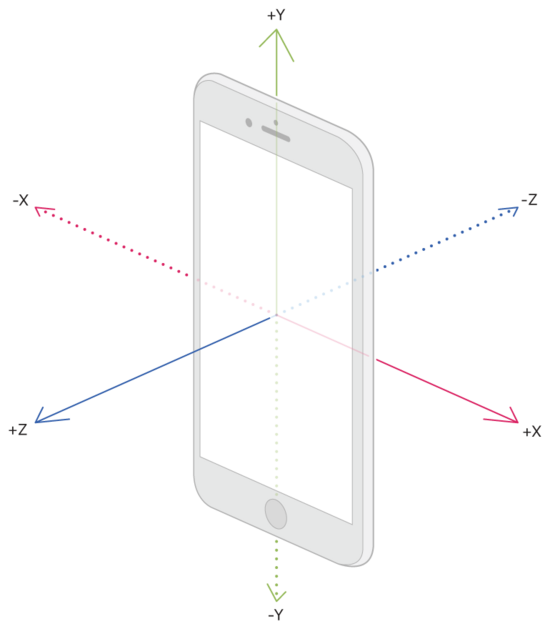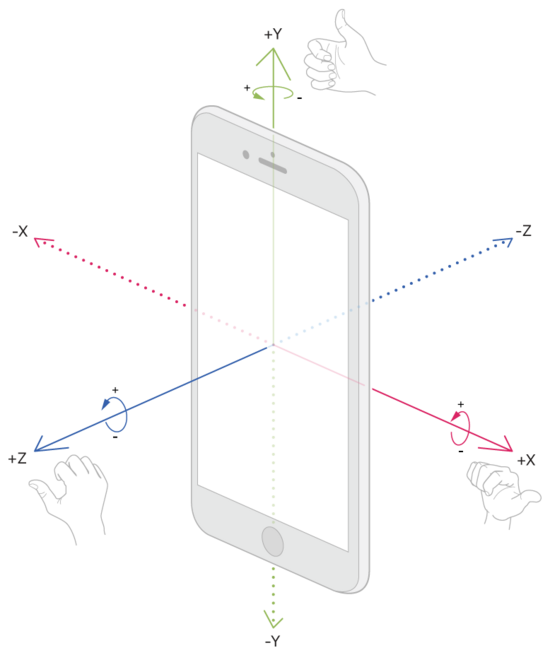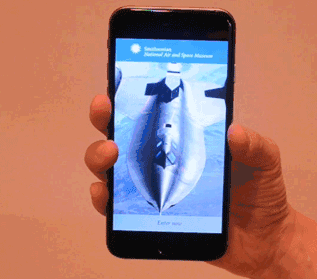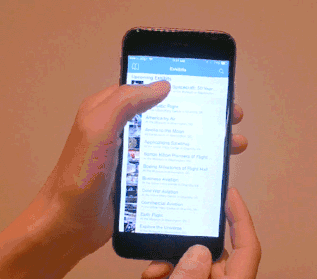жӮЁеҘҪпјҢзҷ»еҪ•еҗҺжүҚиғҪдёӢи®ўеҚ•е“ҰпјҒ
иҝҷзҜҮж–Үз« дё»иҰҒдёәеӨ§е®¶еұ•зӨәдәҶвҖңiOSдёӯCoreMotionеҰӮдҪ•е®һзҺ°и®ҫеӨҮиҝҗеҠЁеҠ йҖҹеәҰи®ЎйҷҖиһәд»ӘвҖқпјҢеҶ…е®№з®ҖиҖҢжҳ“жҮӮпјҢжқЎзҗҶжё…жҷ°пјҢеёҢжңӣиғҪеӨҹеё®еҠ©еӨ§е®¶и§ЈеҶіз–‘жғ‘пјҢдёӢйқўи®©е°Ҹзј–еёҰйўҶеӨ§е®¶дёҖиө·з ”究并еӯҰд№ дёҖдёӢвҖңiOSдёӯCoreMotionеҰӮдҪ•е®һзҺ°и®ҫеӨҮиҝҗеҠЁеҠ йҖҹеәҰи®ЎйҷҖиһәд»ӘвҖқиҝҷзҜҮж–Үз« еҗ§гҖӮ
з”ЁдәҺеӨ„зҗҶеҠ йҖҹеәҰи®ЎпјҢйҷҖиһәд»ӘпјҢи®ЎжӯҘеҷЁе’ҢдёҺзҺҜеўғжңүе…ізҡ„дәӢ件гҖӮ
Core MotionжЎҶжһ¶д»ҺiOSи®ҫеӨҮзҡ„жқҝиҪҪ硬件пјҲеҢ…жӢ¬еҠ йҖҹи®ЎпјҢйҷҖиһәд»ӘпјҢи®ЎжӯҘеҷЁпјҢзЈҒеҠӣи®Ўе’Ңж°”еҺӢи®ЎпјүжҠҘе‘ҠдёҺиҝҗеҠЁе’ҢзҺҜеўғжңүе…ізҡ„ж•°жҚ®гҖӮжӮЁеҸҜд»ҘдҪҝз”ЁжӯӨжЎҶжһ¶и®ҝ问硬件з”ҹжҲҗзҡ„ж•°жҚ®пјҢд»ҘдҫҝжӮЁеҸҜд»ҘеңЁеә”з”ЁзЁӢеәҸдёӯдҪҝз”Ёе®ғгҖӮдҫӢеҰӮпјҢжёёжҲҸеҸҜиғҪдҪҝз”ЁеҠ йҖҹеәҰи®Ўе’ҢйҷҖиһәд»Әж•°жҚ®жқҘжҺ§еҲ¶еұҸ幕дёҠзҡ„жёёжҲҸиЎҢдёәгҖӮ иҝҷдёӘжЎҶжһ¶зҡ„и®ёеӨҡжңҚеҠЎйғҪеҸҜд»Ҙи®ҝ问硬件记еҪ•зҡ„еҺҹе§ӢеҖје’ҢиҝҷдәӣеҖјзҡ„еӨ„зҗҶзүҲжң¬гҖӮеӨ„зҗҶеҗҺзҡ„еҖјдёҚеҢ…жӢ¬з¬¬дёүж–№еӣ зҙ еҜ№иҜҘж•°жҚ®зҡ„йҖ жҲҗдёҚеҲ©еҪұе“Қзҡ„жғ…еҶөгҖӮдҫӢеҰӮпјҢеӨ„зҗҶзҡ„еҠ йҖҹеәҰи®ЎеҖјд»…еҸҚжҳ з”ұз”ЁжҲ·еј•иө·зҡ„еҠ йҖҹеәҰпјҢиҖҢдёҚжҳҜз”ұйҮҚеҠӣеј•иө·зҡ„еҠ йҖҹеәҰгҖӮ
еңЁiOS 10.0жҲ–д№ӢеҗҺзүҲжң¬зҡ„iOSеә”з”ЁзЁӢеәҸеҝ…йЎ»еңЁе…¶Info.plistж–Ү件дёӯеҢ…еҗ«дҪҝз”ЁиҜҙжҳҺKeyзҡ„жҸҸиҝ°пјҢд»Ҙе‘ҠзҹҘз”ЁжҲ·иҺ·еҸ–жүҖйңҖзҡ„ж•°жҚ®зұ»еһӢеҸҠиҺ·еҸ–ж•°жҚ®зұ»еһӢзҡ„зӣ®зҡ„гҖӮжңӘиғҪеҢ…еҗ«иҝҷдәӣKeyдјҡеҜјиҮҙеә”з”ЁзЁӢеәҸеҙ©жәғгҖӮзү№еҲ«жҳҜи®ҝй—®иҝҗеҠЁе’ҢеҒҘиә«ж•°жҚ®ж—¶пјҢеҝ…йЎ»еЈ°жҳҺ NSMotionUsageDescription
и®ҫеӨҮиҝҗеҠЁ
и®ҫеӨҮиҝҗеҠЁжңҚеҠЎжҸҗдҫӣдәҶдёҖз§Қз®ҖеҚ•зҡ„ж–№жі•пјҢи®©жӮЁиҺ·еҸ–еә”з”ЁзЁӢеәҸзҡ„иҝҗеҠЁзӣёе…іж•°жҚ®гҖӮеҺҹе§Ӣзҡ„еҠ йҖҹеәҰи®Ўе’ҢйҷҖиһәд»Әж•°жҚ®йңҖиҰҒеӨ„зҗҶпјҢд»Ҙж¶ҲйҷӨе…¶д»–еӣ зҙ пјҲеҰӮйҮҚеҠӣпјүзҡ„еҒҸе·®гҖӮи®ҫеӨҮиҝҗеҠЁжңҚеҠЎдёәжӮЁеӨ„зҗҶиҝҷдәӣж•°жҚ®пјҢдёәжӮЁжҸҗдҫӣеҸҜд»Ҙз«ӢеҚідҪҝз”Ёзҡ„зІҫзЎ®ж•°жҚ®гҖӮдҫӢеҰӮпјҢжӯӨжңҚеҠЎдёәз”ЁжҲ·еҗҜеҠЁзҡ„еҠ йҖҹеәҰе’ҢйҮҚеҠӣеј•иө·зҡ„еҠ йҖҹеәҰжҸҗдҫӣеҚ•зӢ¬зҡ„еҖјгҖӮеӣ жӯӨпјҢжӯӨжңҚеҠЎеҸҜи®©жӮЁдё“жіЁдәҺдҪҝз”Ёж•°жҚ®жқҘж“ҚзәөжӮЁзҡ„еҶ…е®№пјҢиҖҢдёҚжҳҜеӨ„зҗҶиҜҘж•°жҚ®гҖӮ и®ҫеӨҮиҝҗеҠЁжңҚеҠЎдҪҝз”ЁеҸҜз”Ёзҡ„硬件жқҘз”ҹжҲҗCMDeviceMotionеҜ№иұЎпјҢе…¶дёӯеҢ…еҗ«д»ҘдёӢдҝЎжҒҜпјҡ
и®ҫеӨҮеңЁдёүз»ҙз©әй—ҙдёӯзӣёеҜ№дәҺеҸӮиҖғжЎҶжһ¶зҡ„ж–№еҗ‘пјҲжҲ–е§ҝжҖҒпјү
ж— еҒҸзҡ„ж—ӢиҪ¬йҖҹеәҰ
еҪ“еүҚйҮҚеҠӣзҹўйҮҸ
з”ЁжҲ·з”ҹжҲҗзҡ„еҠ йҖҹеәҰзҹўйҮҸпјҲж— йҮҚеҠӣпјү
еҪ“еүҚзҡ„зЈҒеңәзҹўйҮҸ
еҠ йҖҹи®Ў

иҜҘеӣҫдёәпјҢеҠ йҖҹеәҰи®ЎжІҝxпјҢyе’ҢzиҪҙзҡ„йҖҹеәҰеҸҳеҢ–
еҠ йҖҹеәҰи®ЎжөӢйҮҸжІҝдёҖдёӘиҪҙзҡ„йҖҹеәҰеҸҳеҢ–гҖӮ жүҖжңүзҡ„iOSи®ҫеӨҮйғҪжңүдёҖдёӘдёүиҪҙеҠ йҖҹеәҰи®ЎпјҢе®ғеңЁеӣҫ1жүҖзӨәзҡ„дёүдёӘиҪҙдёӯзҡ„жҜҸдёҖдёӘиҪҙдёҠжҸҗдҫӣеҠ йҖҹеәҰеҖјгҖӮеҠ йҖҹеәҰи®ЎжҠҘе‘Ҡзҡ„еҖјд»ҘйҮҚеҠӣеҠ йҖҹеәҰзҡ„еўһйҮҸиҝӣиЎҢжөӢйҮҸпјҢеҖј1.0д»ЈиЎЁ9.8зұізҡ„еҠ йҖҹеәҰ жҜҸз§’пјҲжҜҸз§’пјүеңЁз»ҷе®ҡзҡ„ж–№еҗ‘гҖӮ еҸ–еҶідәҺеҠ йҖҹеәҰзҡ„ж–№еҗ‘пјҢеҠ йҖҹеәҰеҖјеҸҜиғҪжҳҜжӯЈеҖјжҲ–иҙҹеҖјгҖӮ
йҷҖиһәд»Ә

иҜҘеӣҫдёәпјҢж—ӢиҪ¬еҸҚеҗ‘йҖҹзҺҮеҜ№йҷҖиһәд»Әз»•xпјҢyе’ҢzиҪҙзҡ„еҪұе“ҚеҸҳеҢ–
йҷҖиһәд»ӘжөӢйҮҸи®ҫеӨҮеӣҙз»•з©әй—ҙиҪҙж—ӢиҪ¬зҡ„йҖҹзҺҮгҖӮ и®ёеӨҡiOSи®ҫеӨҮйғҪжңүдёҖдёӘдёүиҪҙйҷҖиһәд»ӘпјҢе®ғеҸҜд»ҘеңЁеӣҫ1жүҖзӨәзҡ„дёүдёӘиҪҙдёӯзҡ„жҜҸдёҖдёӘиҪҙдёҠжҸҗдҫӣж—ӢиҪ¬еҖјгҖӮж—ӢиҪ¬еҖјд»Ҙз»ҷе®ҡиҪҙжҜҸз§’зҡ„еј§еәҰдёәеҚ•дҪҚиҝӣиЎҢжөӢйҮҸгҖӮ ж №жҚ®ж—ӢиҪ¬зҡ„ж–№еҗ‘пјҢж—ӢиҪ¬еҖјеҸҜд»ҘжҳҜжӯЈеҖјжҲ–иҙҹеҖјгҖӮ
д»Јз ҒзӨәдҫӢ
Pushж–№ејҸиҺ·еҸ–ж•°жҚ®
еҠ йҖҹеәҰи®Ў
CMMotionManager *manager = [[CMMotionManager alloc] init];
if ([manager isAccelerometerAvailable] && ![manager isAccelerometerActive]){
NSOperationQueue *queue = [[NSOperationQueue alloc] init];
manager.accelerometerUpdateInterval = 0.1;//и®ҫзҪ®дҝЎжҒҜжӣҙж–°йў‘зҺҮ(0.1sиҺ·еҸ–дёҖж¬Ў)
[manager startAccelerometerUpdatesToQueue:queue
withHandler:^(CMAccelerometerData *accelerometerData, NSError *error)
{
CMAcceleration acceleration = accelerometerData.acceleration;
NSLog(@"x = %.04f", acceleration.x);
NSLog(@"y = %.04f", acceleration.y);
NSLog(@"z = %.04f", acceleration.z);
}];
}йҷҖиһәд»Ә
CMMotionManager *manager = [[CMMotionManager alloc] init];
if ([manager isGyroAvailable] && ![manager isGyroActive]){
NSOperationQueue *queue = [[NSOperationQueue alloc] init];
manager.gyroUpdateInterval = 0.1;//и®ҫзҪ®дҝЎжҒҜжӣҙж–°йў‘зҺҮ(0.1sиҺ·еҸ–дёҖж¬Ў)
[manager startGyroUpdatesToQueue:queue
withHandler:^(CMGyroData *gyroData, NSError *error)
{
CMRotationRate rotationrate = gyroData.rotationRate;
NSLog(@"x = %.04f", rotationRate.x);
NSLog(@"y = %.04f", rotationRate.y);
NSLog(@"z = %.04f", rotationRate.z);
}];
}Pullж–№ејҸиҺ·еҸ–ж•°жҚ®
#define SCREEN_WIDTH [UIScreen mainScreen].bounds.size.width
#define SCREEN_HEIGHT [UIScreen mainScreen].bounds.size.height
@interface ViewController ()
@property (strong, nonatomic) CMMotionManager *motionManager;
//UI
@property (strong, nonatomic) UIButton *starButton; //еҗҜеҠЁ MotionManager
@property (strong, nonatomic) UIButton *pullButton; //жӢүеҸ–ж•°жҚ®
@property (strong, nonatomic) UIButton *stopButton; //еҒңжӯў MotionManager
@end
@implementation ViewController
#pragma mark - жҮ’еҠ иҪҪ
- (CMMotionManager *)motionManager{
if (!_motionManager) {
_motionManager = [[CMMotionManager alloc] init];
_motionManager.accelerometerUpdateInterval = 0.1;
_motionManager.gyroUpdateInterval = 0.1;
}
return _motionManager;
}
- (UIButton *)starButton{
if (!_starButton) {
_starButton = [[UIButton alloc]initWithFrame:CGRectMake(50, 100, 50, 50)];
[_starButton setTitle:@"еҗҜеҠЁ" forState:UIControlStateNormal];
[_starButton addTarget:self action:@selector(startMotion) forControlEvents:UIControlEventTouchUpInside];
}
return _starButton;
}
- (UIButton *)pullButton{
if (!_pullButton) {
_pullButton = [[UIButton alloc]initWithFrame:CGRectMake(SCREEN_WIDTH/2-50, 100, 100, 50)];
[_pullButton setTitle:@"жӢүеҸ–ж•°жҚ®" forState:UIControlStateNormal];
[_pullButton addTarget:self action:@selector(pullMotionData) forControlEvents:UIControlEventTouchUpInside];
}
return _pullButton;
}
- (UIButton *)stopButton{
if (!_stopButton) {
_stopButton = [[UIButton alloc]initWithFrame:CGRectMake(SCREEN_WIDTH-100, 100, 50, 50)];
[_stopButton setTitle:@"еҒңжӯў" forState:UIControlStateNormal];
[_stopButton addTarget:self action:@selector(stopMotion) forControlEvents:UIControlEventTouchUpInside];
}
return _stopButton;
}
#pragma mark - з”ҹе‘Ҫе‘ЁжңҹеӨ„зҗҶ
- (void)viewDidLoad {
[self.view addSubview:self.starButton];
[self.view addSubview:self.pullButton];
[self.view addSubview:self.stopButton];
}
#pragma mark - Pull
- (void)startMotion{
if (self.motionManager.isAccelerometerActive == NO) {
[self.motionManager startAccelerometerUpdates];
}
if (self.motionManager.isGyroActive == NO){
[self.motionManager startGyroUpdates];
}
}
- (void)pullMotionData{
//йҷҖиһәд»ӘжӢүеҸ–ж•°жҚ®
CMGyroData *gyroData = [self.motionManager gyroData];
CMRotationRate rotationrate = gyroData.rotationRate;
NSLog(@"x = %.04f", rotationRate.x);
NSLog(@"y = %.04f", rotationRate.y);
NSLog(@"z = %.04f", rotationRate.z);
//еҠ йҖҹеәҰи®ЎжӢүеҸ–ж•°жҚ®
CMAccelerometerData *data = [self.motionManager accelerometerData];
CMAcceleration acceleration = data.acceleration;
NSLog(@"x = %.04f", acceleration.x);
NSLog(@"y = %.04f", acceleration.y);
NSLog(@"z = %.04f", acceleration.z);
}
- (void)stopMotion{
//йҷҖиһәд»Ә
if (self.motionManager.isGyroActive == YES) {
[self.motionManager stopGyroUpdates];
}
//еҠ йҖҹеәҰи®Ў
if (self.motionManager.isAccelerometerActive == YES) {
[self.motionManager stopAccelerometerUpdates];
}
}
@end
Device Motion жӢ“еұ•еҠҹиғҪ

CMMotionManager *manager = [[CMMotionManager alloc] init];
if ([manager isDeviceMotionAvailable] && ![manager isDeviceMotionActive]){
manager.deviceMotionUpdateInterval = 0.01f;
[manager startDeviceMotionUpdatesToQueue:[NSOperationQueue mainQueue]
withHandler:^(CMDeviceMotion *data, NSError *error) {
double rotation = atan2(data.gravity.x, data.gravity.y) - M_PI;
self.imageView.transform = CGAffineTransformMakeRotation(rotation);
}];
}еҠ йҖҹеәҰи®ЎжӢ“еұ•еҠҹиғҪ

CMMotionManager *manager = [[CMMotionManager alloc] init];
manager.accelerometerUpdateInterval = 0.1;
if ([manager isAccelerometerAvailable] && ![manager isAccelerometerActive]){
NSOperationQueue *queue = [[NSOperationQueue alloc] init];
[manager startAccelerometerUpdatesToQueue:queue
withHandler:^(CMAccelerometerData *accelerometerData, NSError *error)
{
CMAcceleration acceleration = accelerometerData.acceleration;
if (acceleration.x < -2.0) {
dispatch_async(dispatch_get_main_queue(), ^{
[self.navigationController popViewControllerAnimated:YES];
});
}
}];
}д»ҘдёҠжҳҜвҖңiOSдёӯCoreMotionеҰӮдҪ•е®һзҺ°и®ҫеӨҮиҝҗеҠЁеҠ йҖҹеәҰи®ЎйҷҖиһәд»ӘвҖқиҝҷзҜҮж–Үз« зҡ„жүҖжңүеҶ…е®№пјҢж„ҹи°ўеҗ„дҪҚзҡ„йҳ…иҜ»пјҒзӣёдҝЎеӨ§е®¶йғҪжңүдәҶдёҖе®ҡзҡ„дәҶи§ЈпјҢеёҢжңӣеҲҶдә«зҡ„еҶ…е®№еҜ№еӨ§е®¶жңүжүҖеё®еҠ©пјҢеҰӮжһңиҝҳжғіеӯҰд№ жӣҙеӨҡзҹҘиҜҶпјҢж¬ўиҝҺе…іжіЁдәҝйҖҹдә‘иЎҢдёҡиө„и®Ҝйў‘йҒ“пјҒ
е…ҚиҙЈеЈ°жҳҺпјҡжң¬з«ҷеҸ‘еёғзҡ„еҶ…е®№пјҲеӣҫзүҮгҖҒи§Ҷйў‘е’Ңж–Үеӯ—пјүд»ҘеҺҹеҲӣгҖҒиҪ¬иҪҪе’ҢеҲҶдә«дёәдё»пјҢж–Үз« и§ӮзӮ№дёҚд»ЈиЎЁжң¬зҪ‘з«ҷз«ӢеңәпјҢеҰӮжһңж¶үеҸҠдҫөжқғиҜ·иҒ”зі»з«ҷй•ҝйӮ®з®ұпјҡis@yisu.comиҝӣиЎҢдёҫжҠҘпјҢ并жҸҗдҫӣзӣёе…іиҜҒжҚ®пјҢдёҖз»ҸжҹҘе®һпјҢе°Ҷз«ӢеҲ»еҲ йҷӨж¶үе«ҢдҫөжқғеҶ…е®№гҖӮ
жӮЁеҘҪпјҢзҷ»еҪ•еҗҺжүҚиғҪдёӢи®ўеҚ•е“ҰпјҒ